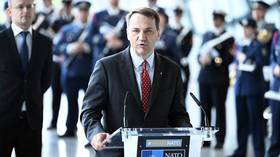Cyprus crisis is its own problem, not EU's - former Austria Chancellor
The Cyprus crisis won’t affect the eurozone as such, argues former Chancellor of Austria Wolfgang Schüssel. It is up to the republic to prove they are committed and able to make their sustainable contribution in order not to increase their debt.
Schussel told RT he is certain the EU will leave the current crisis stronger than it was before.
RT: Mr. Schüssel, thank you very much for being with
us. Let’s start with Cyprus.How will these troubles affect the
entire European economy?
Wolfgang Schüssel: Cyprus is a specific case. It’s a tiny
country with an economy of around 0.1-0.2% of the eurozone’s GDP.
The problem was that Cyprus had eight times more turnover or
balances of banks than GDP. This is absolutely unsustainable.
Everybody knew it within the EU. People, the mass media, the
newspapers were all the time complaining something must be done, so
nobody should be surprised.
RT:If everybody knew about that it could have been
avoided?
WS: Sure. The Cyprus government, not this government but the
previous one led by a former communist, they should have done
something much earlier to reduce the financial sector. I mean it’s
unsustainable – you cannot have such a huge financial, banking
sector.
RT:So who is to blame right now when it has already
happened?
WS: I’m not playing blaming games.
RT:Ok, who is responsible for that?
WS: I think the responsibility is on Cyprus. But again, the
EU is ready to support and help, and 10 billion euros of fresh
loans is not nothing. This is a big support mainly from the
northern part of Europe coming from Germany, the Netherlands,
Austria – the economically stronger partners.
RT:The EU authorities want private depositors to pay,
not bank shareholders. What reason do they have to care more about
bankers than people?
WS: The idea is not to increase the debt and I think it’s
quite understandable. Why should anybody think that Cyprus can pay
back such a huge debt of over 160%? 120-130% is by far enough. I
think all-in-all the Cyprus government is now obliged to find a way
out – either to sell something or offer a bigger deal. In my
opinion, for instance, it could be a fascinating test case for
recuperation between the EU, Russia, Turkey, Israel and Palestine
to solve the greater problem of Cyprus – the reunification of
Cyprus. What about the gas and oil reserves together with
Palestine’s and Israel’s or the defense expenditures of the Greek
and Turkish sides? If there is a general agreement everybody will
win. Look, the problem is that you need to stick to the limit
imposed by the IMF – 120-130% of debt compared to GDP. This
explains why Cyprus has to offer something between 5 and 6 billion
euros. I don’t mean loans but a sustainable contribution not to
increase the debt.
RT:So, is it entirely Cyprus’ problem right
now?
WS: It is Cyprus’ problem. I think it will not affect the
eurozone as such. It could create a negative tendency, it’s true,
but not for the EU. This is not good for Russian depositors, for
people on the international financial markets, it’s true, but it’s
up to Cyprus so say what should be done.

RT:You’ve mentioned Austria, which is doing much better
economically than most of the eurozone countries. How do
people in your country take the fact that they have to bailout
troubled economies? Don’t they think that they’d better abstained
from the eurozone?
WS: It’s true there is a debate, which is infuriated by
some boulevard newspapers. But I think the general mood of the
Austrian people is quite moderate. They understand that we are part
of a political union, a solidarity union and we have to take the
responsibility as well because we are also benefitting from the
European market. We are almost 20 years in the EU. This was a big
achievement for us. I was a young minister of economic affairs
starting from 1989 so I was part of the fall of the iron curtain,
the collapse of the Soviet Empire and the enlargement was at that
time a positive experience for us. And we benefitted it a
lot.
RT:Did everybody benefit from the union?
WS: In the long run, yes. But we have problems. Look, for instance, Greece is a good example. Since 2000 they had average wages increased 50-60%. It was not sustainable. The productivity was de facto stagnating. Germany, for instance, had very low increase of wages and Austria as well but the productivity was very good. I mean some countries didn’t use the benefits of the common currency - low interest rates etc. in a reasonable way. Now they have to pay the price.
RT:Do you think all the members benefitted equally?
WS: They should have used this benefit with additional
structural reforms. Look at the labor market. I’ve worked hard
together with Mario Monti in Italy during the last couple of years.
France is having the same difficulties. The labor market there is
extremely irregulated. It’s extremely difficult to have a flexible
labor market. The old people’s jobs are secure and the young people
have no chances to get a job at all. I think the benefit was there.
The common currency means low interest rates for those
participating, but it should have been accompanied by structural
reforms from the very first moment in order to be competitive, and
this was the real failure.
RT:You were Austria’s Chancellor at the time, when
Greece and Italy, for instance, were adopted into the eurozone
although they weren’t ready economically, they didn’t qualify. What
was going on?
WS: Nobody dragged them in. They wanted. They knocked at the door. Romano Prodi, the Prime Minister of Italy at that time, and Costas Simitis of Greece desperately wanted to become members of the eurozone and they cheated it.
RT:Greece rigged some data and the German authorities were aware of that. Why was it ignored?
WS: I’m not aware of the fact that the German authorities knew about it, but I was part of the decision. The thing was that the EU Commission, the institution which should have said whether Greece was right or not, said yes, Greece was right. So the question is was the Commission right saying Greece was ready. I think it was a big mistake and Greece and we are all now paying the price for that.
RT:But why now people have to suffer from the politicians’ irresponsible decisions?
WS: I understand this. But on the other hand you
shouldn’t forget that there is the other side of the coin. In
Cyprus, for instance, those who made deposits got much more
interests during the last five years – around 20-25%, than those in
Germany and Austria probably had altogether. It would be very naïve
to think that you could get profits of 20% interest rates.
Everybody knew this could be a problem. It’s always risky to take
decisions. You cannot blame others – the blame game doesn’t help.
If you invest your money in Switzerland you know you won’t get
higher interest rates but it’s safe. If you go to a country with
high interest rates you know the risk is much bigger and there is
no guarantee for that.
RT:Greece and Cyprus cases have highlighted the lack
of real trust between the countries-members of the EU and eurozone,
and this is tearing Europe apart.
WS: If everything goes well than the pro-European
approach is strong. If you are in a crisis than the blame game
starts – who is responsible, who is the scapegoat? Now we are deep
into this kind of situation. I think everybody is responsible and
should be a little bit self-critical.
RT:Do you think the risks are high of a split within the eurozone and the EU?
WS: There are concerns and I think they are
understandable because the debts are huge. I speak about 1.6
trillion euros. Nobody can imagine how much it means. You have to
explain what is happening, why we are doing this and that. One of
the biggest problems in the European decision-shaping process is
the lack of timely and better explanation. It is absolutely
important to explain to the citizens and voters what is happening
and why.
RT:Isn’t it too late for that?
WS: It’s never too late. At the end the EU will come up
of the crisis stronger than it was before – this is my firm
believe.
RT:What doesn’t kill you make you stronger, is it what you mean?
WS: If we take the right decision than the outcome will
be positive. The Chinese word for ‘crisis’ means an option between
taking a negative or a positive side. This is exactly about that.
If we learn the lessons the effects will be positive.
RT:And if not?
WS: If not the consequences might be tremendous. That’s
for sure.
The statements, views and opinions expressed in this column are solely those of the author and do not necessarily represent those of RT.












